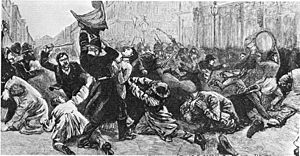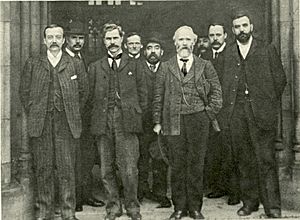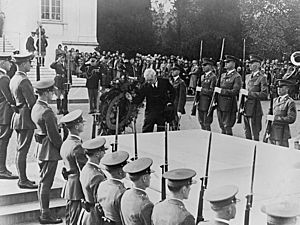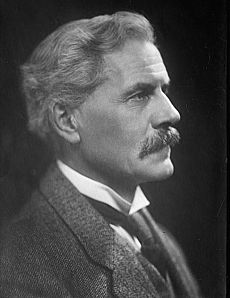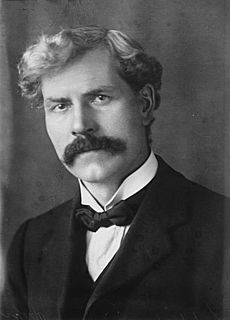Ramsay MacDonald facts for kids
Quick facts for kids
Ramsay MacDonald
|
|||||||||||||||||||||||||||||||||||||
|---|---|---|---|---|---|---|---|---|---|---|---|---|---|---|---|---|---|---|---|---|---|---|---|---|---|---|---|---|---|---|---|---|---|---|---|---|---|
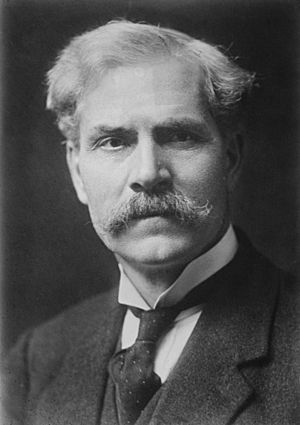
MacDonald c. 1920s
|
|||||||||||||||||||||||||||||||||||||
| Prime Minister of the United Kingdom | |||||||||||||||||||||||||||||||||||||
| In office 5 June 1929 – 7 June 1935 |
|||||||||||||||||||||||||||||||||||||
| Monarch | George V | ||||||||||||||||||||||||||||||||||||
| Preceded by | Stanley Baldwin | ||||||||||||||||||||||||||||||||||||
| Succeeded by | Stanley Baldwin | ||||||||||||||||||||||||||||||||||||
| In office 22 January 1924 – 4 November 1924 |
|||||||||||||||||||||||||||||||||||||
| Monarch | George V | ||||||||||||||||||||||||||||||||||||
| Preceded by | Stanley Baldwin | ||||||||||||||||||||||||||||||||||||
| Succeeded by | Stanley Baldwin | ||||||||||||||||||||||||||||||||||||
| Leader of the Opposition | |||||||||||||||||||||||||||||||||||||
| In office 4 November 1924 – 5 June 1929 |
|||||||||||||||||||||||||||||||||||||
| Monarch | George V | ||||||||||||||||||||||||||||||||||||
| Prime Minister | Stanley Baldwin | ||||||||||||||||||||||||||||||||||||
| Preceded by | Stanley Baldwin | ||||||||||||||||||||||||||||||||||||
| Succeeded by | Stanley Baldwin | ||||||||||||||||||||||||||||||||||||
| In office 21 November 1922 – 22 January 1924 |
|||||||||||||||||||||||||||||||||||||
| Monarch | George V | ||||||||||||||||||||||||||||||||||||
| Prime Minister |
|
||||||||||||||||||||||||||||||||||||
| Preceded by | H. H. Asquith | ||||||||||||||||||||||||||||||||||||
| Succeeded by | Stanley Baldwin | ||||||||||||||||||||||||||||||||||||
| Leader of the Labour Party | |||||||||||||||||||||||||||||||||||||
| In office 22 November 1922 – 1 September 1931 |
|||||||||||||||||||||||||||||||||||||
| Deputy | J. R. Clynes | ||||||||||||||||||||||||||||||||||||
| Preceded by | J. R. Clynes | ||||||||||||||||||||||||||||||||||||
| Succeeded by | Arthur Henderson | ||||||||||||||||||||||||||||||||||||
| In office 6 February 1911 – 5 August 1914 |
|||||||||||||||||||||||||||||||||||||
| Chief Whip |
|
||||||||||||||||||||||||||||||||||||
| Preceded by | George Barnes | ||||||||||||||||||||||||||||||||||||
| Succeeded by | Arthur Henderson | ||||||||||||||||||||||||||||||||||||
| Lord President of the Council | |||||||||||||||||||||||||||||||||||||
| In office 7 June 1935 – 28 May 1937 |
|||||||||||||||||||||||||||||||||||||
| Prime Minister | Stanley Baldwin | ||||||||||||||||||||||||||||||||||||
| Preceded by | Stanley Baldwin | ||||||||||||||||||||||||||||||||||||
| Succeeded by | The Viscount Halifax | ||||||||||||||||||||||||||||||||||||
| Leader of the House of Commons | |||||||||||||||||||||||||||||||||||||
| In office 5 June 1929 – 7 June 1935 |
|||||||||||||||||||||||||||||||||||||
| Preceded by | Stanley Baldwin | ||||||||||||||||||||||||||||||||||||
| Succeeded by | Stanley Baldwin | ||||||||||||||||||||||||||||||||||||
| In office 22 January – 3 November 1924 |
|||||||||||||||||||||||||||||||||||||
| Preceded by | Stanley Baldwin | ||||||||||||||||||||||||||||||||||||
| Succeeded by | Stanley Baldwin | ||||||||||||||||||||||||||||||||||||
| Secretary of State for Foreign Affairs | |||||||||||||||||||||||||||||||||||||
| In office 22 January – 3 November 1924 |
|||||||||||||||||||||||||||||||||||||
| Preceded by | The Marquess Curzon | ||||||||||||||||||||||||||||||||||||
| Succeeded by | Austen Chamberlain | ||||||||||||||||||||||||||||||||||||
|
|||||||||||||||||||||||||||||||||||||
| Personal details | |||||||||||||||||||||||||||||||||||||
| Born |
James McDonald Ramsay
12 October 1866 Lossiemouth, Scotland |
||||||||||||||||||||||||||||||||||||
| Died | 9 November 1937 (aged 71) North Atlantic Ocean |
||||||||||||||||||||||||||||||||||||
| Resting place | Holy Trinity Church, Spynie | ||||||||||||||||||||||||||||||||||||
| Political party |
|
||||||||||||||||||||||||||||||||||||
| Spouse |
Margaret Gladstone
(m. 1896; died 1911) |
||||||||||||||||||||||||||||||||||||
| Children | 6, including Malcolm and Ishbel | ||||||||||||||||||||||||||||||||||||
| Alma mater | Birkbeck, University of London | ||||||||||||||||||||||||||||||||||||
| Profession | Politician | ||||||||||||||||||||||||||||||||||||
| Signature | |||||||||||||||||||||||||||||||||||||
James Ramsay MacDonald (born James McDonald Ramsay; 12 October 1866 – 9 November 1937) was an important British politician. He made history as the first Prime Minister of the United Kingdom from the Labour Party. He led two Labour governments, first for nine months in 1924, and then from 1929 to 1931.
From 1931 to 1935, MacDonald led a special "National Government." This government was mostly made up of members from the Conservative Party. Because of this, he was removed from the Labour Party.
MacDonald was one of the main people who helped create the Labour Party in 1900. He became the leader of the Labour Party in 1922. His second government (1929–1931) faced huge challenges because of the Great Depression. He formed the National Government to try and fix the economy. He stepped down as Prime Minister in 1935 due to his health.
Historians now see MacDonald as a key figure. He helped build the Labour Party and guided Britain through tough economic times.
Contents
Early Life and Learning
Growing Up in Lossiemouth
Ramsay MacDonald was born in Lossiemouth, Moray, Scotland. His parents, John MacDonald and Anne Ramsay, were not married. In the 1800s, this was sometimes a challenge, but in his farming community, it was less of a problem.
He went to school in Lossiemouth from 1872 to 1881. At 15, he started working on a farm. Soon after, he became a pupil teacher at Drainie parish school. In 1885, he moved to Bristol and joined a group called the Democratic Federation. This group later became the Bristol Socialist Society. In early 1886, he moved to London.
Discovering Socialism in London
After a short time without work, MacDonald found a job as a clerk. During this period, he became more interested in socialism. He joined the Socialist Union, which believed in achieving socialist goals through Parliament.
MacDonald saw the "Bloody Sunday" protest in Trafalgar Square in 1887. This event, where police clashed with protestors, made him write a pamphlet about it.
He also cared about Scottish politics. He supported the idea of Scotland having its own government, known as Home Rule. He felt that Scotland was losing its unique culture.
Education was very important to MacDonald. He studied science at Birkbeck Literary and Scientific Institution. However, he became ill from exhaustion before his exams. This ended his dream of a science career. He later became a Governor of Birkbeck in 1895.
In 1888, MacDonald became a private secretary to Thomas Lough, a Radical politician. This job opened many doors for him. He met important people and learned about elections. He also started working as a freelance journalist. He joined the Fabian Society and gave lectures about its ideas.
Starting in Politics
In 1892, MacDonald went to Dover to support a Labour candidate. He impressed the local people and was chosen to be a candidate himself. He said his campaign would be under a Labour Party banner.
In 1893, Keir Hardie formed the Independent Labour Party (ILP). MacDonald joined this party in 1894. He ran for Parliament in 1895 but lost. He tried again in 1900 for a seat in Leicester, but lost again.
That same year, he became Secretary of the Labour Representation Committee (LRC). This group was the start of the Labour Party. He made a deal with Liberal politician Herbert Gladstone. This agreement allowed Labour candidates to run in some areas without the Liberal Party opposing them. This helped Labour win its first seats in the House of Commons.
In 1896, he married Margaret Ethel Gladstone. She was not related to the famous Liberal Prime Minister William Gladstone. Their marriage was very happy. They traveled a lot, visiting Canada, the United States, South Africa, Australia, New Zealand, and India.
In 1906, the LRC changed its name to the "Labour Party". MacDonald was elected as a Member of Parliament (MP) for Leicester. He became one of the leaders of the Parliamentary Labour Party. He believed Labour should become the main left-wing party, replacing the Liberals.
Becoming Party Leader
In 1911, MacDonald became the leader of the Labour Party. He was known as a deep thinker for the party. He focused on how society was changing and how the government could become stronger.
Sadly, his wife Margaret became ill and died shortly after he became leader. This deeply affected him for the rest of his life.
MacDonald had always been interested in international affairs. He knew how terrible modern wars could be from his visit to South Africa after the Boer War. When World War I started in August 1914, most of the Labour Party supported the war. However, MacDonald believed Britain should stay neutral. He resigned as party Chairman because he could not support the war. Arthur Henderson became the new leader.
During the early part of the war, many people disliked MacDonald for his anti-war views. He was even accused of being a traitor. In 1915, a magazine published details about his birth, trying to make him look bad. Despite this, he received support from within his party.
As the war continued, his reputation slowly improved. However, he lost his seat in the 1918 election. He called the Treaty of Versailles, which ended the war, "an act of madness."
Return to Parliament (1920–1924)
MacDonald tried to get back into Parliament in 1921 but lost. In 1922, he was elected as an MP for Aberavon in Wales. This showed that his career was back on track. The Labour Party reunited and he was again chosen as its leader.
By this time, MacDonald had moved away from the more extreme socialist ideas. He strongly opposed the radical ideas that came after the Russian Revolution of 1917. He became a strong opponent of Communism.
In 1922, MacDonald visited Palestine. He spoke about his views on different types of Jewish people.
MacDonald was known for his sometimes unclear speeches. There were concerns in the party about what he would do if Labour formed a government.
In the 1923 election, the Conservatives lost their majority. In January 1924, King George V asked MacDonald to form a Labour government. This was a minority government, meaning it did not have a majority of seats in Parliament. It relied on the support of the Liberals. On 22 January 1924, MacDonald became the first Labour Prime Minister. He was also the first Prime Minister from a working-class background.
First Government (1924)
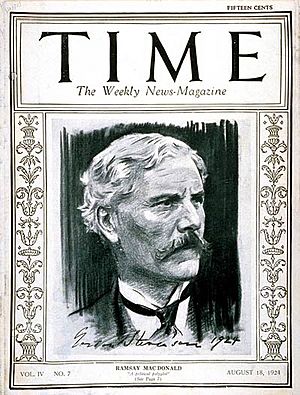
Even though MacDonald had never been in government before, he showed great energy and skill. He chose Philip Snowden as Chancellor of the Exchequer, in charge of the country's money. MacDonald himself took on the role of Foreign Secretary. Ten other cabinet members also came from working-class backgrounds, which was a big change for Britain.
His main goal was to fix the problems caused by the 1919 Treaty of Versailles. He wanted to solve the issue of war payments (reparations) and improve relations with Germany. King George V wrote in his diary that MacDonald "wishes to do the right thing."
His government lasted only nine months. However, it still managed to help the unemployed by extending benefits. It also passed a Housing Act that greatly increased council housing for low-paid workers.
Foreign Policy Efforts
MacDonald had always been a strong supporter of international peace. He wanted to prevent future wars through open diplomacy and disarmament.
In March 1924, he stopped work on a military base in Singapore. He believed building the base would harm efforts for disarmament.
In June 1924, MacDonald held a conference in London with the countries that had been allies in World War I. They agreed on a new plan for Germany's war payments. German representatives joined the meeting, and the "London Settlement" was signed. This was a big success for MacDonald. He also gave a speech at the League of Nations in Geneva, calling for general European disarmament.
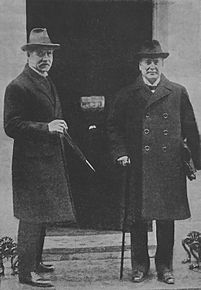
MacDonald's government also officially recognized the Soviet Union. They started talks to create a trade agreement and discuss the repayment of loans from before the Russian Revolution. However, these treaties were not popular with the Conservative or Liberal parties.
The government's time ended because of a case involving a left-wing newspaper. The government decided not to prosecute the newspaper for encouraging soldiers to mutiny. The Conservatives and Liberals then challenged the government. MacDonald's government lost a vote in Parliament, and he had to call a new election.
The Zinoviev Letter
Just four days before the election, a newspaper published a letter. This letter, supposedly from a Soviet official named Grigory Zinoviev, urged British communists to push for the treaties with the Soviet Union. It also suggested helping to spread communist ideas in England.
Historians now mostly agree the letter was a fake. However, it caused a lot of fear about communism in Britain. The government had received the letter earlier and planned to protest it, but the newspaper published it first.
In Opposition (1924–1929)
The 1924 United Kingdom general election resulted in a big win for the Conservative Party. The Labour Party lost 40 seats, but their total vote actually increased. The biggest change was that the Liberal Party lost many seats and became the third-largest party. This showed that Labour had truly replaced the Liberals as the main opposition to the Conservatives.
Second Government (1929–1931)
Leading Labour Again
In the May 1929 election, Labour won the most seats (288) but not a majority. The Conservatives won 260, and the Liberals held the balance of power with 59 seats. MacDonald had to move to a safer election district because his old one was becoming difficult.
MacDonald formed another minority government, again with some Liberal support. This time, he focused more on problems at home. Arthur Henderson became Foreign Secretary, and Philip Snowden was again in charge of the country's money. Margaret Bondfield became the first woman to be a cabinet minister, as Minister of Labour.
MacDonald's second government was stronger than his first. In 1930, they increased unemployment pay. They also passed laws to improve wages and conditions in the coal industry. A Housing Act 1930 was passed to clear out slums. However, a plan to raise the school-leaving age to 15 failed due to opposition.
In international affairs, MacDonald held conferences in London with leaders from India. He offered them more self-government. In April 1930, he also signed the London Naval Treaty, which limited naval weapons with several other countries.
Facing the Great Depression
MacDonald's government struggled to deal with the economic crisis that followed the Stock Market Crash of 1929. Unemployment doubled to over two and a half million by the end of 1930. The government faced a tough choice: keep the budget balanced and protect the value of the British currency, or continue helping the poor and unemployed when tax money was falling.
In 1931, a committee suggested big cuts in government spending and payments to the unemployed. This was to avoid a budget deficit.
National Government (1931–1935)
Forming a New Government
Some ministers in MacDonald's cabinet would not agree to the spending cuts. Because of this disagreement, MacDonald resigned on 24 August 1931. However, King George V asked him to form a special "National Government" with the Conservatives and Liberals.
MacDonald, Snowden, and another minister were quickly removed from the Labour Party. They formed a new group called National Labour Organisation. Many in the Labour Party felt that MacDonald had betrayed them. They saw it as a way for him to save his own career. MacDonald, however, said he was making a sacrifice for the good of the country.
The 1931 Election
In the 1931 general election, the National Government won a huge victory, taking 554 seats. The Labour Party, now led by Arthur Henderson, won only 52 seats. This was Labour's worst defeat ever. MacDonald was sad to see the Labour Party lose so badly. He had hoped the National Government would be temporary and that he could return to Labour.
Leading the National Government
MacDonald had a huge mandate from the election, but he was getting older and less effective. The Conservatives, especially Stanley Baldwin and Neville Chamberlain, largely controlled domestic policy.
MacDonald focused heavily on foreign policy. He led British groups to international conferences, including meetings about disarmament and war payments. He went to Rome in 1933 to help Germany rejoin European politics. In 1933, he also led a world economic conference in London. Many nations attended, but they could not agree on solutions. This failure marked the end of international economic cooperation for a decade.
MacDonald was deeply hurt by the anger from his former Labour colleagues. He still saw himself as a true Labour man, but he lost almost all his old friends.
Stepping Down
By 1933, MacDonald's health was poor. His speeches became hard to understand. Some, like Winston Churchill, criticized him for not standing up to Adolf Hitler.
MacDonald knew his powers were fading. In 1935, he agreed to step down as Prime Minister after King George V's Silver Jubilee celebrations. He resigned on 7 June 1935, and Stanley Baldwin became Prime Minister. MacDonald stayed in the cabinet as Lord President.
Last Years and Death (1935–1937)
In the November 1935 election, MacDonald lost his seat. However, he was re-elected to Parliament in January 1936 for the Combined Scottish Universities seat.
His health continued to get worse. King George V died in 1936, and MacDonald was deeply saddened. He had a strong friendship with the King. After the King's death, MacDonald's health declined even more.
Doctors suggested a sea voyage to help him. MacDonald died on board a ship, the MV Reina del Pacifico, on 9 November 1937, at age 71. The ship was sailing in the North Atlantic Ocean.
His body was brought back to Plymouth, England. His funeral was held in Westminster Abbey on 26 November. His ashes were buried in Holy Trinity Church, Spynie in Lossiemouth, next to his wife Margaret and their son David.
His Legacy
For many years, the Labour Party saw MacDonald as a traitor. They blamed him for their big election defeat in 1931. However, since the 1960s, historians have started to see him differently.
Scholars now appreciate his important role in creating and building the Labour Party. They also recognize his efforts to keep peace between the two world wars. Historians like David Marquand argue that MacDonald's decision in 1931 to form the National Government was made to help the country during a crisis. They also highlight his lasting ideas about socialism and how he helped Labour become a party that could lead the government.
Personal Life
Ramsay MacDonald married Margaret Ethel Gladstone in 1896. They had a very happy marriage and six children. Their son Malcolm MacDonald became a successful politician and diplomat. Their daughter Ishbel MacDonald was very close to her father and acted as his hostess when he was Prime Minister. Another son, Alister Gladstone MacDonald, became a well-known architect.
MacDonald was heartbroken when Margaret died in 1911. After her death, Ishbel became his main companion and cared for him.
MacDonald's religious views changed over his life. He started as a Christian but later became interested in humanism. He joined the Ethical Church, a humanist group, and was even its chairman several times.
Because of his opposition to World War I, MacDonald became very unpopular. In 1916, he was removed from the Moray Golf Club because of his pacifist views. He was deeply hurt by this. Although the club later voted to let him rejoin in 1929, he refused the offer.
Honours
In 1930, MacDonald was elected a Fellow of the Royal Society. He also received honorary degrees from several universities, including Wales, Glasgow, Edinburgh, Oxford, and McGill.
See also
 In Spanish: Ramsay MacDonald para niños
In Spanish: Ramsay MacDonald para niños
 | John T. Biggers |
 | Thomas Blackshear |
 | Mark Bradford |
 | Beverly Buchanan |


